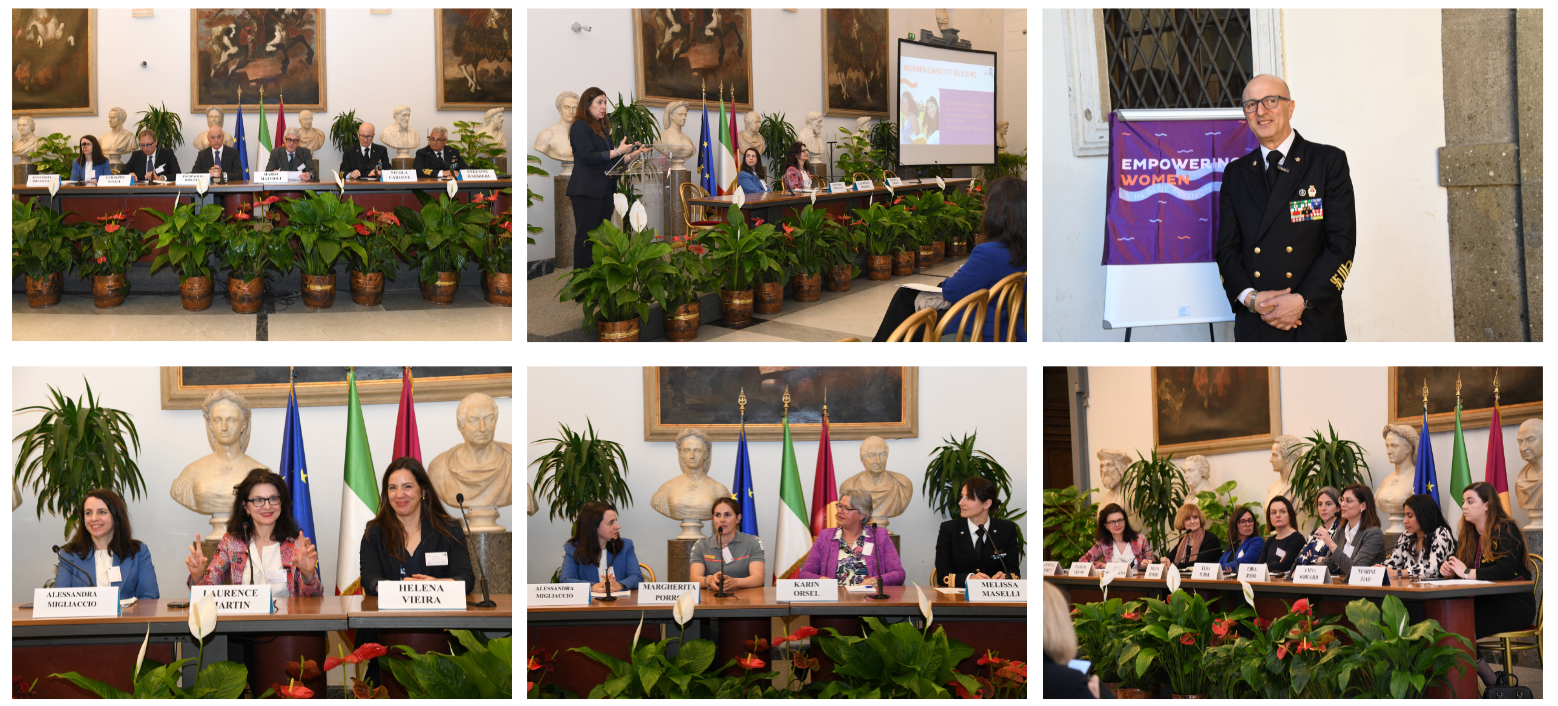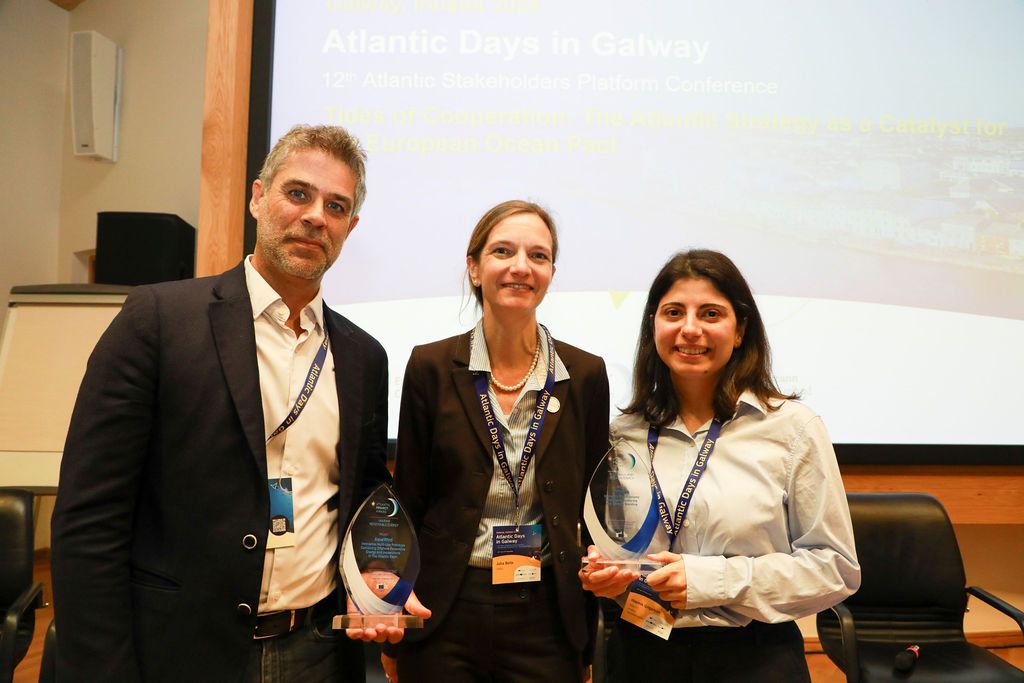WIN-BIG Mediterranean Event: three days of Impact, Innovation & Inclusion
The WIN-BIG Mediterranean Event brought together experts and changemakers to push forward one clear goal: making the Blue Economy more inclusive, diverse, and innovative. From policy discussions to hands-on workshops, the event sparked powerful conversations about gender equality, sustainability, and the future of maritime industries.
Watch the recording of the event here!
Download the event photos
With voices from across the Mediterranean and beyond, we explored challenges, celebrated achievements, and set the course for lasting change. Each session, each panel, and each story reinforced a simple truth: when women are empowered, the entire Blue Economy thrives.
The event opened with a call to action: How do we create more opportunities for women in the Blue Economy? The first set of speeches underscored the urgency of this issue.
Mario Mattioli, President of the Italian Maritime Cluster, called for a more inclusive and diverse workforce, urging industry leaders to take concrete steps toward closing the gender gap. On the same note, the EU Commissioner for Fisheries and Oceans Costas Kadis emphasised that women already play a key role in maritime tourism, transport, research, and aquaculture, but their visibility and access to decision-making positions need to improve. The European Commission is already taking action, integrating gender equality into the upcoming EU Ocean Pact.
The Italian Navy and Coast Guard also shared their progress on inclusion, with Vice Admiral Nicola Carlone highlighting that over 12% of the Coast Guard is now made up of women. He spoke about "Olivia," an EU initiative promoting gender balance in maritime security, and reaffirmed the commitment to building a truly inclusive Blue Economy. Meanwhile, Italy’s first-ever national maritime strategy is taking shape, with Vice Admiral Pierpaolo Ribuffo stressing that innovation and sustainability must go hand in hand with gender equality.
The morning set a clear direction: gender equality isn’t just about fairness. It’s a strategic necessity. Without the full participation of women, the Blue Economy will never reach its true potential.

From Policy to Action: Turning Words into Change
The first panel of the day “Policy, Strategy & Action for Gender Inclusion” focused on how to turn policy into real opportunities. Felix Leinemann (DG MARE) outlined the EU’s Gender Equality Strategy emphasising that gender balance must be a core aspect of Blue Economy policy, while WIN-BIG’s coordinator Helena Vieira introduced some preliminary findings from our running survey gathering gender data across the EU BuE sectors.
Gender balance in the blue economy isn’t just a ‘women’s issue’, it’s a collective responsibility. We need to move beyond words and take action: building skills, fostering inclusion, and ensuring access to opportunities. The future of the sector depends on it.
Laurence Martin (l Italian Maritime Cluster) connected gender inclusion with another pressing challenge: decarbonisation. The transition to renewable energy and sustainable maritime practices, offers a unique opportunity to empower women by creating new technical and leadership roles.
The conversation was not just about abstract policies but real, tangible actions. Encouraging more women to pursue technical careers, improving training and capacity-building, and ensuring access to financial resources were all highlighted as key steps forward. The message was clear: if the industry truly wants to innovate and grow, it must invest in women.
The Power of Women’s Stories
The second panel shifted from policies to personal experiences with “Love for the Oceans – Experience from Women’s Eyes”, giving the stage to women who have broken barriers in the maritime world. Their inspiring stories are a testament to just how far women have come and how much further they’re ready to go.
Karin Orsel, President of the European Shipowners Association, spoke about the shifting tides in the industry. Digitalisation is opening up new opportunities, creating pathways for women to take on roles that were once out of reach. But progress isn’t automatic. Even today, only 2% of seafarers are women. Without strong policies and clear initiatives, breaking into leadership positions remains an uphill battle. That’s why ECSA has introduced an inclusion and diversity toolkit, now available on all ships, to ensure that opportunities aren’t just talked about but actively created.
Melissa Maselli of the Italian Navy took the audience beneath the surface - literally. She shared insights into the world of undersea robotics, where technology is reshaping military operations and ocean exploration. The underwater environment is not only rich in resources but also critical to global security. By integrating robotics, the Navy can carry out high-risk missions more safely and efficiently. But innovation doesn’t happen in isolation. Maselli emphasised the need for collaboration across industries, highlighting the Italian Underwater National Hub, launched in 2023, as a model for fostering cutting-edge advancements through partnerships.
Finally, Margherita Porro, helmswoman for the Luna Rossa Prada Pirelli Women’s Team, brought the conversation back to the human side of breaking barriers. As a young girl, she never imagined a career in professional sailing. Last year she won the Puig Women’s America’s Cup with her crew. Margherita spoke about the power of teamwork. Initially, the seven women on her team found themselves competing for just four spots on the boat. But instead of turning against one another, they made a conscious decision to lift each other up. That shift from competition to solidarity became the key to their strength.
These stories were not just personal triumphs; they were reminders of what’s possible when women are given the tools, the support, and the space to lead. The ocean is no longer off-limits, and the future is being shaped by the women who refuse to be left on shore.

Investing in Women: A Smart Business Move
The second half of the day was dedicated to showcasing concrete strategies to elevate women’s roles in the industry. The discussions made one thing clear: gender equality isn’t just about fairness, it’s about unlocking economic potential, driving innovation, and ensuring the future of the Blue Economy is built on the full strength of its talent pool.
Milena Messori from the European Investment Bank highlighted the economic case for gender inclusion. Women’s full participation in the workforce could add a staggering $30 trillion to global GDP. Yet, the Blue Economy remains male-dominated, limiting its own potential by overlooking female talent. To change this, the EIB is working on a Diversity Investment Manual that could help define projects with a gender perspective—an approach that, if successful, could be expanded across sectors worldwide. Messori also emphasized the importance of supporting women-led businesses and those creating products tailored to women’s needs. In Italy, where women still earn about 20% less than men on average, systemic change is long overdue.
Elsa Tudal from the French Ministry of Ecologic Transition shared France’s efforts to increase the number of women in maritime professions. The government is implementing a national strategy to raise awareness about career opportunities at sea, both for men and women, while also ensuring better representation of women on ships. The key is creating an environment where women not only enter the field but also thrive in it.
The conversation expanded beyond national efforts, with Anna Dorangricchia from the Union for the Mediterranean discussing initiatives to integrate gender equality into all areas of the Blue Economy. She highlighted the 2021 Ministerial Declaration, which prioritizes gender balance in energy, tourism, coastal management, and biodiversity. Meanwhile, Patrizia Grifoni stressed the need for better data collection to track women’s participation in the sector. Without reliable, up-to-date statistics, it’s difficult to measure progress or identify where change is needed most.
Collaboration was another major theme, with initiatives like "Call Me Blue" strengthening ties between maritime clusters in the Mediterranean. Representatives from Tunisia, Algeria, and Libya underscored the importance of cross-border partnerships in creating a more inclusive and innovative sector.
The day’s final panel turned to science and technology, where women remain underrepresented despite their critical role in research and innovation. Maria Cristina Pedicchio of APRE reminded everyone that the ocean is Europe’s greatest ally in prosperity, defense, and environmental sustainability. But to fully harness its potential, Europe needs to invest in talent—especially women. The numbers speak for themselves: in the ICT sector, for example, women represent just 22% of PhD graduates.
Pierpaolo Campostrini from CORILA illustrated the gender gap across scientific careers. While representation is relatively balanced at entry level, the gap widens dramatically as careers progress. Only 13-24% of senior marine science positions are held by women. He argued that improving gender balance isn’t just a matter of equality—it directly impacts conservation outcomes and the effectiveness of maritime spatial planning.
In the private sector, women are also making strides despite persistent barriers. Barbara Amerio of Permare - Amer Yachts spoke about the yachting industry’s ongoing transformation. While traditionally male-dominated, the sector is embracing new opportunities through digitalization and innovation. Amerio sees herself as a role model for young women hoping to enter the field, proving that leadership in the Blue Economy isn’t reserved for men.
Leonardo Manzari from WestMed National Hub for Italy ended the discussion on a powerful note: despite the challenges, women are already leading change. More than half of Italy’s innovation hubs in the Blue Economy are run by women. They aren’t just participating in the industry—they are driving it forward.
The day ended with a strong message: progress is happening, but it requires continuous effort, collaboration, and action. Gender equality in the Blue Economy isn’t just a goal, it’s the key to its future.
Watch the recording of the event here!
Download the event photos


